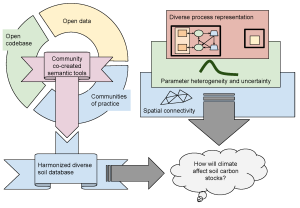
Kathe Todd-Brown, Ph.D., an assistant professor in the Department of Environmental Engineering Sciences within the Engineering School of Sustainable Infrastructure & Environment, has been awarded the National Science Foundation’s (NSF) CAREER award to improve the predictive understanding of soil carbon dynamics by connecting different theories with diverse measurements.
With a background in computational biogeochemistry, Dr. Todd-Brown will study the decay rate of soil by connecting observed decay trends with the theoretical understanding of the underlying processes through a new multi-scale modeling framework. Currently, soil decay rates are difficult to predict, and this has an impact on how well we can predict atmospheric greenhouse gas levels and set emissions targets. This new research will help improve predictions by linking the decay rates to soil properties processes through a new multi-scale modeling framework.
Soil impacts our daily lives from food to our ecosystem including atmospheric carbon dioxide, water cycling and nutrient management. Understanding how soils decay, or lose carbon stocks, is critical to understanding the broader carbon cycle and predicting future greenhouse gas levels.

“We’re trying to understand soil decomposition, so we can better predict climate change feedbacks, and this will also help us understand nutrient and water cycles in managed and natural ecosystems,” Dr. Todd-Brown said. “We’re going to dive into three key processes that we think control soil carbon dynamics: mineral-organic interactions, microbial metabolism and organic chemistry. All three of these processes level off the rate of carbon soil release at high concentrations but we know that soils release carbon at a rate that does not level off when we look at lab studies. We are designing simulations to look at why this might be.”
Dr. Todd-Brown will also build a data-centered community to co-develop a standardized vocabulary for soil measurements. Currently, different vocabularies and descriptions among researchers around the world hinder the common language and understanding necessary in scientific discussions. “By bringing researchers together to talk about how we talk about data, we can build a better understanding of soils and use these data to develop better models,” Dr. Todd-Brown explained.
The NSF CAREER Award is a competitive award earned by early-career faculty building a foundation for long-term contributions to teaching, research and outreach. For more information on Dr. Todd-Brown’s research, visit https://www.nsf.gov/awardsearch/showAward?AWD_ID=2142483&HistoricalAwards=false.

